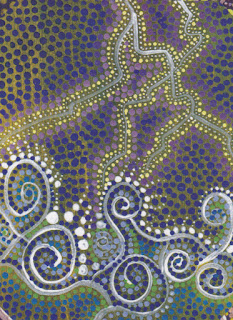The Lightning Tree and Rough Seas cards fit well together. The tree spirit (having experienced an unexpected strike) seems to be intent on offering insights to those currently asea with storms swirling around them. I've been sharing some information with the women I mentor about dealing with tough times, as each of them has had difficult loads to bear of late. Ironically, I learned this week that it's much easier to talk about dealing with hurt and pain than practice what you preach when in the thick of it. The information was however beneficial for me (and helped me cultivate compassion for others), so I thought I would share it with you:
Retraining the Mind
We can easily get caught up in emotional thoughts that don’t always reflect reality accurately. The primitive part of our brain seeks out what keeps us comfortable; it is why we react so strongly to what is pleasant or unpleasant. But our nervous system can be trained to stay with an experience even when things get uncomfortable (I’m not talking here about an actual dangerous situation). For instance, if our boss reviews our work, we might hear some praise and some criticism. If we can stay present instead of getting hooked by our internal stories (“I can’t believe she had the nerve to say that after all the sacrifices I’ve made!”), we won’t end up reacting out of attachment, aversion or delusion. How do we do this?
b) Don’t self-identify – Instead of telling yourself, “I’m so overwhelmed” or “I’m so angry,” remind yourself that this is passing not permanent by saying “This is a moment of suffering.” (Place a hand on your heart.) "Suffering is a natural part of life." (I'm not the only one.) "May I be tender with myself." (Don't judge, just be gentle.)When we identify with the emotion, it tends to stick in the mind as if it is a permanent part of us instead of something passing. As Jan Karon wrote, “We don’t have to define ourselves by our wounds.” [The three-part 'mantra' was adapted from the teachings of Kristin Neff.]
c) Choose mindfully - Ask yourself, what behavior pattern do I want to strengthen?


Poor 'Tree Spirit' standing there minding her own business, cleaning the air and then bam! Mr Lighting makes a strike. Good thing her roots run deep and she can withstand the assault and continue her lively-hood. Easier said than done when the strike hits home.
ReplyDeleteWhen it hits home, it's a wake-up call that no one is immune or lives a charmed life. I can either choose to be angry and feel like a victim or remember I am one of many who experience suffering.
DeleteThis is a helpful post, one that I'll be referring back to. Thanks! - Kate
ReplyDeleteYou are most welcome, Kate. 😊
DeleteIsn't that always the way, it's easier to preach than to practice. And yet, there is a part of us that is also listening in to what we are saying to others. I think this is why we almost always teach what we need to learn :)
ReplyDeleteThanks for sharing this retraining practice!
You're welcome. :) I suppose when I recommend this to others, now it will come from a deep place of compassion for their pain, physical or otherwise!
Delete